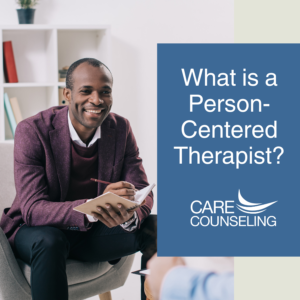What is a Person-Centered Therapist?
 What is a Person-Centered Therapist?
What is a Person-Centered Therapist?
Reading through the bios of therapists, you are likely going to see many common words such as non-judgmental, acceptance, safe space, genuine, and authentic. These are words that are part of a client-centered approach, founded by Carl Rogers. Both client-centered and person-centered are often used interchangeably. They are within the category of humanistic therapy that focuses on the whole person. There is an emphasis on the client’s innate strengths for making positive changes and achieving their goals.
If you seek therapy for things such as wanting to learn more about yourself and your emotions, facilitate personal growth and development, increase positive experiences, learn to trust yourself, and develop a healthier relationship with yourself and others then the person (client) centered-therapy may be a great fit!
Let’s learn more about what a person-centered therapist does.
Rogers viewed each client’s thoughts, feelings, and experiences as unique. His approach to the client-therapist relationship was more collaborative. The client was considered more of a partner than a “patient”. Rogers viewed clients as capable of change and self-directing this change, with therapist congruence, unconditional positive regard, and empathic understanding as important attributes for growth and development.
These attitudes are reflected within person-centered therapists. They see clients as capable, resourceful, and trustworthy. Therapists genuinely care for their clients. They often use essential foundational therapeutic interventions such as active listening, reflection on feelings, using open-ended questions, and paraphrasing. Therapists are attentive to the client.
The Focus is on the Client
Each client is viewed as a unique person. Client-centered therapists take a personalized approach to client care. The client is the focus of interventions, and the therapist works alongside the client.
Nondirective Approach
The client is in the driver’s seat. They set the topics that they want to discuss and interventions that would be helpful as they work towards their goals and becoming the person they want to become (self-actualization goals). The client is viewed as the expert in their life. While a person-centered therapist helps guide exploration through open-ended questions, they don’t direct or give advice.
Therapist Authenticity (Congruence)
A person-centered therapist strives to model being authentic, genuine, and a “real” person within the therapeutic space. This approach can often help clients feel comfortable to become vulnerable in sharing with the therapist as they build rapport and trust.
Acceptance and Unconditional Positive Regard
These are attitudes that a person-centered therapist communicates to their clients through showing genuine care and acceptance without conditions for acceptance within the relationship. This approach can help clients know that they are accepted and valued however they show up in session. Therapy feels like a safe place as clients don’t feel as though they are being judged by their therapist.
Empathic Understanding
A person-centered therapist demonstrates empathic understanding. The therapist communicates cares as they reflect the client’s thoughts and feelings back to them with empathy and understanding.
Emphasis on the Relationship
A person-centered therapist builds rapport as they help connect with clients, especially as they are in an incongruence state such as anxiety. The therapist may utilize themselves as a therapist through immediacy—addressing what is going on between the client and therapist within the relationship which can help strengthen the overall relationship.
While a person-centered approach is a great fit for many clients, there are clients who may not find this approach to be as therapeutically beneficial. That’s OK. It is important to be able to share with your therapist what is helpful for you.
Clients who may struggle with a person-centered approach include the following:
- Clients who are not ready to work on self-actualization goals due to priority being on basic needs, safety concerns, relationship dynamics, or the need to first stabilize mental health symptoms.
- Clients who are wanting a structured or directive approach
- Clients who struggle with identifying goals for therapy and/ or what to talk about
- Clients who are seeking a therapist who is more in the role of a teacher or expert or a provider with specific specialized training outside of person-centered therapy.
Written By: Charlotte Johnson, MA, LPCC



























